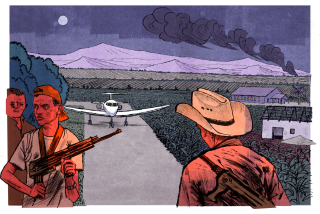His 2nd birthday party was interrupted by a car bomb. Drug kingpin’s son describes growing up
The day Serafin Zambada Ortiz turned 2, a car bomb exploded outside his birthday party.
When he was 9, just hours after he and his mother had left a hotel in Mazatlan, Mexico, to treat an outbreak of the chickenpox, an assassination squad stormed inside, killing his grandparents, uncle and aunt.
It’s what happens when your dad is the one of the most powerful drug kingpins in the world.
The constant threat of violence kept Zambada’s world very small as a child, moving from place to place under the watchful eye of his mother, at times staying hidden indoors while other children got to play soccer.
“I lived in a golden cage with luxuries that were useless,” Zambada wrote of his upbringing amid turbulent narco wars.
Despite his mother’s best efforts to shield him from that world, Zambada couldn’t resist the pull of the family business. By 22, he was the leader of a drug distribution cell when he was caught on a wiretap conspiring to traffic large quantities of cocaine and marijuana from Mexico into San Diego.
By 23, he was in jail.
On Wednesday, more than three years after pleading guilty, Zambada, 27, was sentenced by a San Diego federal judge to 5½ years in prison. The hearing closes a significant chapter in the long-running, ongoing takedown of Mexico’s most powerful trafficking organization: the Sinaloa cartel.
The effort to dismantle the group from top to bottom — largely played out in San Diego — has swept up drug distribution networks, smugglers, hit men, high-ranking leaders and money launderers. Many of the prosecutions have been headed by Adam Braverman, a career prosecutor who is San Diego’s newest U.S. attorney.
At the very top of the organization are Joaquin “El Chapo” Guzman, the public face of the Sinaloa cartel, and his co-leader, Ismael “El Mayo” Zambada Garcia — Serafin’s father — who has operated more from the shadows.
Guzman is awaiting trial in New York on federal charges of heading a massive trafficking operation.
The elder Zambada remains a fugitive, charged in an indictment in San Diego along with two other sons. The State Department is offering a reward of up to $5 million for his capture.
Their family history, outlined in letters to the court and in a sentencing memorandum filed by Serafin’s defense attorney, reads like the gritty cross-border crime dramas that glamorize the narco underworld. Except this one is real.
Zambada Garcia, a farmer by trade, was already a rising star by the time he had a chance encounter with Leticia Ortiz Hernandez in Mexicali in 1988. The two already knew each other, having grown up in neighboring villages outside Culiacan in Sinaloa state.
Ortiz, who had recently earned her psychology degree, ignored the advice of her forest ranger father and restaurateur mother to stay away from the drug trade, and she fell in love with the man 15 years her elder. The couple lived in Tijuana, surrounded by key players in the narco scene.
Ten days after Serafin’s birth across the border in San Diego, future kingpin Benjamin Arellano-Felix stood as the child’s godfather at his baptism. Months later at the boy’s confirmation, Amado Carrillo Fuentes, a leading trafficker known as “Lord of the Skies” for his fleet of cocaine-smuggling planes, stood as another godfather.
Then the peace ended. War broke out with the Arellano-Felix brothers over control of the Tijuana plaza. Serafin’s mother took him and his baby sister to Culiacan, where they thought it would be safer. The car bomb shattered that notion.
“From that day on, our lives were never the same,” the mother recalled in court records. “The same men that not long before stood up for our children in church and promised to raise them to be good Catholics were now trying to kill them.”
She said several teenage boys were murdered in Tijuana for the sole reason that they had played on the same soccer team as Zambada Garcia’s older son from a prior relationship.
The brutality went the other way, too — a cycle of retaliation.
“From 1992 to the year 2000 the days were difficult and bloody and a stupid senseless war where many families were destroyed and with a lot of pain in their hearts,” she said.
When Ortiz’s family was killed by rivals, she hid her family from the outside world, frequently moving from home to home and keeping Serafin from school. His father sent armed guards to live with them.
Ortiz told Serafin that his grandparents had been killed in a robbery, but he was starting to understand his family’s unusual position in society. He’d spot his father’s picture on wanted posters. While Serafin described his dad as someone who provided “love and affection,” he was not a constant presence.
Ortiz, overcome with depression and paranoia, finally took the children and fled to Phoenix. Serafin and his sister, Teresa, got to live as normal schoolchildren there and learned English. But that tranquillity ended two years later, when Ortiz’s visa expired and they returned to the cartel’s stronghold in Mexico.
Serafin and his sister returned to Arizona — this time without their mother — to attend the Orme School, a prestigious boarding school near Prescott.
They moved back to Culiacan after a year.
The Sinaloa cartel’s ally-turned-bitter rival, the Arellano-Felix organization, which had dominated the Tijuana routes until Benjamin’s 2002 arrest, slowly faded from the scene as it became the target of San Diego prosecutions. Benjamin is serving a 25-year sentence in the U.S.
But new rivalries emerged, and the children had to go into hiding again when the Beltran-Leyva Organization splintered from the Sinaloa cartel and a power struggle put family members in the crosshairs. This time, the family escaped to Vancouver, Canada.
Back in Culiacan, Serafin attended college at the Autonomous University of Sinaloa to study agronomy, where classmates said he thrived in his studies and at soccer. But he was drawn back into the world that he’d been sheltered from for so long.
“Unfortunately, I returned to Culiacan Sinaloa and I say unfortunately because in that city there is nothing more than the drug trade,” he wrote in a letter to the judge.
In 2010, still a teenager, he married a girl who also came from a family entrenched in trafficking. The young couple had two children.
“I think it was his way of becoming independent and getting out of the bubble he had always felt he lived in,” his mother surmised.
Authorities have not released much detail about Zambada Ortiz’s managerial role in the cartel. Most documents in the case have been filed under seal.
He was arrested on a warrant in November 2013 as he used the pedestrian lanes to cross into the U.S. at the port of entry in Nogales, Ariz.
Zambada pleaded guilty to a conspiracy to import more than 100 kilograms of cocaine and more than 1,000 kilograms of marijuana into the U.S. from Mexico, according to the plea agreement. He also agreed to forfeit $250,000 in drug proceeds, an amount that has been paid.
On Wednesday, Zambada — allowed to temporarily trade in his jail garb for a white dress shirt and blue slacks — apologized through a Spanish interpreter for his crime and said he looks forward to moving on with his life to raise his two children “in the best way possible.”
In his letter to the judge, Zambada explained further: “In this drug business one hurts a lot of people and I your honor regret having been the cause of causing so much damage to many people with the drug business. I have learned here in this place that drugs destroy many lives.”
For such a high-profile defendant, the hearing was noticeably devoid of the usual spirited argument about how much time he deserved behind bars. Both prosecutors and defense attorneys had previously agreed to the prison term, and U.S. District Judge Dana Sabraw accepted their recommendation.
While the judge called Zambada’s crime “very significant,” he listed several mitigating factors that made a lower sentence reasonable, including his youth, his “genuine remorse,” the lack of violence in his background and the many letters of support from family and friends depicting him as a polite and helpful young man. Without the departures, Zambada had faced a mandatory minimum sentence of 10 years.
It is not known why it took so long to sentence Zambada. With time already served, he should be released by September, said his defense attorney Saji Vettiyil.
He said he plans to finish his college degree and help his mother with her Mexican lychee and mango farm, possibly distributing the fruit to a U.S. market.
To read this article in Spanish click here
Davis writes for the San Diego Union-Tribune.
More to Read
Start your day right
Sign up for Essential California for news, features and recommendations from the L.A. Times and beyond in your inbox six days a week.
You may occasionally receive promotional content from the Los Angeles Times.






